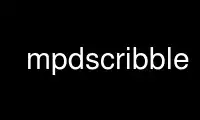
This is the command mpdscribble that can be run in the OnWorks free hosting provider using one of our multiple free online workstations such as Ubuntu Online, Fedora Online, Windows online emulator or MAC OS online emulator
PROGRAM:
NAME
mpdscribble - A Music Player Daemon (MPD) client which submits information about tracks
being played to a scrobbler (e.g. last.fm).
SYNOPSIS
mpdscribble [options]
DESCRIPTION
mpdscribble is a client for MPD, the Music Player Daemon. mpdscribble connects to an MPD
running on the local network and works in parallel with other MPD clients on the network.
By default it will get the hostname and port for mpd from the MPD_HOST and MPD_PORT
environment variables. mpdscribble will use localhost:6600 if those are not set. The
hostname and port can also be specified in the configuration file or on the command line.
$ mpdscribble --host myhost --port=12345
Values specified on the command line override values from the configuration file or
environment variables.
If you want to use mpdscribble with a password-protected MPD, set the environment variable
MPD_HOST to password@host, or specify the host in the configuration file similarly.
OPTIONS
--help Display help and exit.
--version
Display version information and exit.
--no-daemon
Don't daemonize mpdscribble, run it in foreground.
--pidfile FILE
Write the process id to this file.
--daemon-user USERNAME
Change to this system user after daemonization.
--log FILE
Specify log file. The special value "syslog" makes mpdscribble use the local
syslog daemon (which is the default). "-" means log to stderr.
--conf FILE
Read configuration options from file. /etc/mpdscribble.conf is used by default (if
--sysconfdir=/etc).
--host [PASSWORD@]HOSTNAME
Specify host protected by password. To connect via Unix Domain Socket, specify an
absolute path here.
--port PORT
Specify which port the MPD listens on.
--proxy URL
HTTP proxy URL.
--verbose LEVEL
Specify how verbosely mpdscribble should log. Possible values are 0 to 3,
defaulting to 1.
CONFIGURATION
mpdscribble looks for its configuration file first at ~/.mpdscribble/mpdscribble.conf and
then at /etc/mpdscribble.conf (if --sysconfdir=/etc) but this can be overridden by
specifying an alternate configuration file using the command line option --conf.
Supported configuration options:
pidfile = FILE
Write the process id to this file.
log = FILE
The file to which mpdscribble should output debugging information. The special
value "syslog" makes mpdscribble use the local syslog daemon (which is the
default). "-" means log to stderr.
host = [PASSWORD@]HOSTNAME
The host running MPD, possibly protected by a password. To connect via Unix Domain
Socket, specify an absolute path here.
port = PORT
The port that the MPD listens on and mpdscribble should try to connect to.
proxy = URL
HTTP proxy URL.
verbose = 0, 1, 2, 3
How verbose mpdscribble's logging should be. Default is 1. "0" means log only
critical errors (e.g. "out of memory"); "1" also logs non-critical errors (e.g.
"server unreachable"); "2" logs informational messages (e.g. "new song"); "3"
prints a lot of debugging messages.
SCROBBLERS
These options are followed by at least one scrobbler section (choose a unique section name
like "libre.fm" which only appears in the log file; the name "mpdscribble" is reserved).
file = PATH
Log to a file instead of submitting the songs to an AudioScrobbler server.
url = URL
The handshake URL of the scrobbler. Example: "http://post.audioscrobbler.com/",
"http://turtle.libre.fm/"
username = USERNAME
Your audioscrobbler username.
password = MD5SUM
Your Last.fm password, either cleartext or its MD5 sum.
journal = FILE
The file where mpdscribble should store its journal in case you do not have a
connection to the scrobbler. This option used to be called "cache". It is
optional.
Use mpdscribble online using onworks.net services
